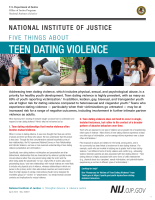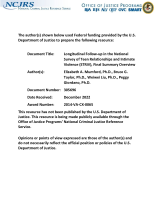Youth development
Five Things About Teen Dating Violence
Longitudinal Follow-up in the National Survey of Teen Relationships and Intimate Violence (STRiV), Final Summary Overview
ABCD Social Development (ABCD-SD)
Exploring mentor practices using data from OJJDP’s Mentoring Enhancement Demonstration Program
How Do “Credible Messenger” Mentors Promote Youth Development? A Retrospective, Longitudinal Study in Atlanta, Birmingham, and Houston
Building Adult Social and Emotional Capacity: A Key Ingredient for Unleashing the Power of Prevention
Group Randomized Trial of School-Based Teen Courts to Address the School to Prison Pipeline, Reduce Aggression and Violence, and Enhance School Safety in Middle and High School Students
Deviant Peer Factors During Early Adolescence: Cause or Consequence of Physical Aggression?
A Cluster Randomized Controlled Trial of the Safe Public Spaces in Schools Program: Final Summary Overview
Assessment of Neighborhood Poverty, Cognitive Function, and Prefrontal and Hippocampal Volumes in Children
Results of a Type 2 Translational Research Trial to Prevent Adolescent Drug Use and Delinquency
Participating in a Policy Debate Program and Academic Achievement Among At-risk Adolescents in an Urban Public School District: 1997-2007
Developmental Trajectories Toward Violence in Middle Childhood: Course, Demographic Differences, and Response to School-Based Intervention
Organized Activity Involvement Among Urban Youth: Understanding Family- and Neighborhood- Level Characteristics as Predictors of Involvement
Preventing Teen Pregnancy and Academic Failure: Experimental Evaluation of a Developmentally Based Approach
Programmatic Prevention of Adolescent Problem Behaviors: The Role of Autonomy, Relatedness, and Volunteer Service in the Teen Outreach Program
Who Benefits Most From a Broadly Targeted Prevention Program? Differential Efficacy Across Populations in the Teen Outreach Program
The development and validation of an algorithm to predict future depression onset in unselected youth
Honor, face, and dignity norm endorsement among diverse North American adolescents: Development of a Social Norms Survey
School Transitions and Student Responses to Victimization - Breakout Session, NIJ Virtual Conference on School Safety
On February 16-18, 2021, the National Institute of Justice hosted the Virtual Conference on School Safety: Bridging Research to Practice to Safeguard Our Schools. This video includes the following presentations:
See the YouTube Terms of Service and Google Privacy Policy
Multi-Component Efforts to Improve School Safety - Breakout Session, NIJ Virtual Conference on School Safety
On February 16-18, 2021, the National Institute of Justice hosted the Virtual Conference on School Safety: Bridging Research to Practice to Safeguard Our Schools. This video includes the following presentations:
See the YouTube Terms of Service and Google Privacy Policy
Overcoming School Safety Intervention Implementation Challenges - Breakout Session, NIJ Virtual Conference on School Safety
On February 16-18, 2021, the National Institute of Justice hosted the Virtual Conference on School Safety: Bridging Research to Practice to Safeguard Our Schools. This video includes the following presentations:
See the YouTube Terms of Service and Google Privacy Policy





